Political processes and institutions. Рубрика в журнале - Arctic and North
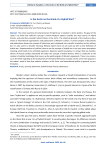
Is the arctic on the brink of a hybrid war?
Статья научная
The article examines the phenomenon of hybrid war in relation to Arctic politics. The goal of the study is to show how valid this concept is, who Western experts consider the main source of hybrid threats, and what they consider hybrid threats in the Arctic. The empirical grounds of the study are documents of international organizations and publications of Western authors. A critical analysis of documents and publications shows the concept of hybrid war was introduced into scientific circulation by the military, but it is also used in a broader meaning. Military experts have not yet come up with a clear definition of hybrid war. Representatives of political science use the concept of hybrid war in an even more amorphous meaning, which leads to its unlimited expansion. Based on specific examples, it is shown that any manifestations of Russian politics potentially fall under the concept of hybrid threats, which is conducive to the creation of political mythology that covers up the political goals of Western opponents. There is no consensus in Western publications regarding the productivity of the concepts of hybrid threats and hybrid wars, but a more common radical point of view, which limits down to the imposition of confrontational relations in the Arctic and in international politics in general.
Бесплатно
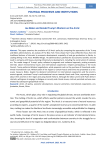
Joe Biden and Donald Trump’s Rhetoric on the Arctic
Статья научная
This paper examines the evolution of US Arctic policy by comparing the approaches of the Trump and Biden administrations. An analysis of The New York Times shows that Trump shifted the focus from the traditional balance of interests to economic development, especially oil and gas production in Alaska, including drilling in the Arctic Wildlife Refuge. His administration justified this by economic benefits and the need to compete with Russia, planning infrastructure development, including the construction of icebreakers. The media image of Trump’s policy reflected a pragmatic and unilateral approach, putting economic interests above environmental issues and international cooperation. Despite participating in the Arctic Council, Trump preferred bilateral negotiations, while proposals such as the purchase of Greenland undermined international trust. Militarization of the region to contain Russia and China was presented as a necessary measure. Biden, despite his declared commitment to international cooperation and the environmental agenda, continued Trump’s confrontational course towards Russia and China, expressing concern about their activities in the region and using hostile rhetoric. Although the 2021 summit with Putin demonstrated a willingness to engage in dialogue on security and climate issues, mistrust persisted and was exacerbated by subsequent geopolitical events.
Бесплатно
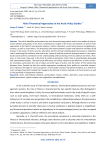
Main Theoretical Approaches in the Arctic Policy Studies
Статья научная
The article identifies and analyzes the main theoretical approaches used in the studies of international relations and politics in the Arctic. Contemporary studies of the Arctic use elements of several main approaches in the field of international relations: realism, liberalism, social constructivism and global governance, as well as some others. The theoretical alternative between realism and liberalism manifests itself primary in the issues of Arctic security. Liberalism and the concept of global governance play an important role in explaining the multilevel and multi-actor nature of political processes and governance in the region. Social constructivism contributes to the understanding and functioning of Arctic political narratives. However, in most cases, they exist in the form of implicit assumptions rather than as systematically developed and substantiated models. The theoretical differences are mainly related to the definition of units and levels of analysis, particularly the role of states and other types of actors, and the nature of the relationship between them. Despite the fact that realistic approaches considering Arctic politics as inevitable competition of states in the logic of “zero-sum games” remain quite common, the general tendency is to search for more complex theoretical models that recognize the diversity of actors involved in Arctic processes, as well as the possibility of cooperative relations.
Бесплатно
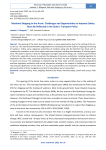
Статья научная
The opening of the Arctic Sea routes ushers in many opportunities due to the melting of the Arctic Sea ice. The International Maritime Organization has introduced the Polar Code for shipping and training of seafarers. Follow up by regulatory authorities of incidents along with the Northern Sea Route and increasing ship casualties in the Arctic region have been analyzed, including the adequacy of existing regulations. The author’s opinion is that the inadequate oversight mechanism brings out a need for governments of the Arctic, especially in Russia, to examine the adequacy of measures undertaken, including regulation to implement the Polar code, associated infrastructure in the Arctic for safe navigation and the current state of search and rescue. The challenges in implementing the Polar Code and the necessity for independent maritime regulatory authorities and sharing information relating to the analysis of incidents are discussed. The practical significance of the article is in its use by policymakers and researchers working on transport policy and safety of Arctic navigation, and also for educational use at universities.
Бесплатно
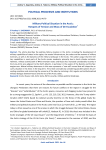
Military-Political Situation in the Arctic: Hotspots of Tension and Ways of De-Escalation
Статья научная
The article describes the politico-military situation in the Arctic, including the development of military capabilities of states in the region, the coastal infrastructure, the scales and the manner of military exercises, as well as the dynamics of the military landscape in the Arctic. The authors argue that the military capabilities in most parts of the Arctic remain moderate, primarily due to harsh climate restraints. However, military activity both of NATO member-states and Russia has increased considerably recently in the Euro-Arctic area adjacent to the North Atlantic, in particular in the waters of the Barents and the Norwegian seas. Mutual military deterrence in this area represents a "new old" normal that will shape the security situation in the Arctic in the long term. The article concludes by considering possible options for preventing escalation and minimizing the concerns of the sides by restoring a full, regular and institutionalized military dialogue between Russia and the rest of the Arctic states.
Бесплатно
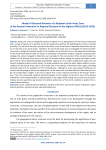
Статья научная
Being one of the strategically important regions for the development of the Russian Federation and a variety of aspects of its security, the Arctic represents a platform for defending the country’s national priorities. The nature of the policy pursued in the Arctic zone of the Russian Federation determines the status of the state as an Arctic power. Therefore, the aim of the study was to investigate the electoral preferences and to design the electoral model of the residents of the Russian Arctic in the gubernatorial elections in the period from 2013 to 2022. By means of multifactor comparative analysis using the clustering methodology, the author managed to determine such variables for the construction of the electoral model of a resident of the Russian Arctic zone as the level of electoral activity, voting for typical and atypical candidates and for the conditionally designated candidate “against all” as a marker of legitimate support for registered candidates and/or protest voting. The study revealed that, unlike the other federal subject’s voters, residents of the Russian Arctic take a more active part in the election of the head of the region, providing electoral support to the candidates of the “United Russia”, although in some cases atypical voting was observed, the percentage of which was insignificant. At the same time, the data obtained show that the number of invalid ballots is higher in the Arctic regions than in the constituent entities of the Russian Federation. Thus, the constructed model of electoral behavior of the resident of the Arctic zone of the Russian Federation in the implementation of regional policy in the region allows taking into account not only quantitative, but also qualitative parameters of electoral preferences of the Arctic residents to predict the results of future elections.
Бесплатно
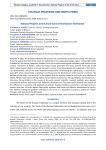
National projects in the Arctic zone of the Russian Federation
Статья научная
In 2021, the Russian Federation will assume the chairmanship of the Arctic Council. This fact confirms the special attention of the country’s leadership to the unique geostrategic region. In December 2020, President of the Russian Federation Vladimir Putin, at an online meeting with volunteers and finalists of the contest “Volunteer of Russia”, noted that Russia would grow with the Arctic and the territories of the North. Many Russian citizens’ lives and the state’s success in the international arena depend on this territory’s development. One of the most important mechanisms for achieving the stated goals is national projects (NP), which should make a significant contribution to the development of the country’s territory. The purpose of the study is to assess NP in the subjects that are entirely related to the Arctic zone: Murmansk region, Nenets Autonomous okrug (NAO), Yamalo-Nenets Autonomous okrug (YANAO), and Chukotka Autonomous okrug (CHAO). In the course of the work, general scientific research methods were applied: comparative analysis, data comparison, induction, deduction, etc. The study results showed that, despite all the differences in economic and geographical position, financial condition, population, and regional development priorities, all Arctic regions have similar problems that hinder the effective development of territories. Without solving the problems indicated in the work, it is impossible to expect a qualitative «breakthrough» and implement the NP’s goals.
Бесплатно
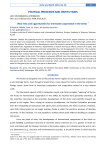
New risks and opportunities for interstate cooperation in the Arctic
Статья научная
Despite the growing tension in Russia-West relations, the Arctic region continues to remain a zone of peace and cooperation. The level of interstate collaboration here is extremely high, unlike other maritime regions. The interaction is developing in scientific research, protection of the marine environment and biodiversity, regulation of fisheries, improvement of search and rescue efforts, control of oil spills, and regulation of navigation. However, interstate competition has not disappeared in the Arctic. The countries participating in the maritime activities in the region often have completely different priorities and are firmly defending their national interests. Under sanctions’ pressure, the Russian Federation is forced to seek new partners and allies in the Arctic. This choice is extremely difficult since the coincidence of positions on one issue or another is often minimal. In order to defend its interests, Russia needs to achieve such a format of interaction with the Arctic and non-Arctic countries which would be extremely mutually beneficial and work for the good of our country, but not to its detriment.
Бесплатно
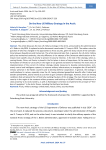
On the New US Military Strategy in the Arctic
Статья научная
The article discusses the new US military strategy in the Arctic, announced by the administration of J. Biden in July 2024. It replaced a similar document issued under D. Trump in 2019. The authors raise the question of what has changed in the approaches to Arctic security, given the sharp nature of the contradictions between Republicans and Democrats. The article demonstrates that, in general, the US Arctic military policy has maintained continuity; the only difference is the attempt of the Democrat administration to formulate more specific areas of activity to protect US security interests. In the text of the strategy, when assessing threats, China, not Russia, is placed in the first place in terms of importance. At the same time, the formulation of threats to US security in the region is too general and seems far-fetched. The main areas of implementation of the current US military strategy include measures to develop communication, command, control and intelligence systems; to improve military infrastructure; to strengthen the US and NATO military presence in the Nordic countries and to develop defense cooperation. In general, the strategy is confrontational in nature, especially since the US, having obtained geopolitical benefits after Finland and Sweden joined NATO, clearly intends to use them to gain unilateral advantages. However, there are limiting conditions that will prevent the US from fully realizing the plans of this strategy. The main threat to Russia’s security in the region is the constant military presence and build-up of US/NATO military infrastructure in close proximity to its Arctic borders, as well as Washington’s intention to implement the principle of “freedom of navigation” in the Arctic Ocean, including the Northern Sea Route.
Бесплатно
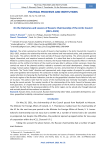
On the Outcomes and Lessons of Russia’s Chairmanship of the Arctic Council (2021–2023)
Статья научная
The article summarizes the results of Russia’s chairmanship in the Arctic Council (AC, Council) in 2021–2023, analyzes the relationship with the state national and international policy, and systematizes the key results. The authors identify four main periods of Russian chairmanship. The article presents general logical, theoretical, and empirical research methods. It is noted that due to the boycott of a number of Western countries because of the events in Ukraine, the Russian Federation focused its efforts in the Arctic direction on the northern territories of the country and was able to achieve certain successes. Russia has carried out most of the planned activities related to economic and social development, climate change, ecology, human capital, indigenous peoples’ activities, tourism, and prevention of emergency situations in the Arctic. The “Arctic Youth” direction well represented, and a large number of projects for youth events and career guidance were launched. The conclusion is made: during the 2-year period the government paid special attention to improving the functioning of the Northern Sea Route, socio-economic development of the Arctic regions of the Russian Federation, but due to the geopolitical situation Russia failed to fully realize its plans. The authors note that the course of the chairmanship was internally incomplete, especially during the recent periods. The remote transfer of the chairmanship of the Arctic Council to Norway raises many questions. It is hoped that the full status and composition of the AC will be restored. Russia still proceeds from the fact that the pressing problems of the Arctic region can be solved only through balanced and mutually beneficial international co-operation.
Бесплатно
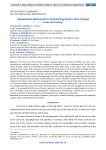
Organizational mechanisms for implementing Russia's Arctic strategy in the 21st century
Статья научная
The Arctic in the 21st century remains a popular topic in the natural-scientific, economic, socio-humanitarian and political spheres. The relevance of studying the Arctic is determined by the fact that in recent decades, deep and irreversible transformations have taken place in this region, and a full understanding of the causes and consequences of which for the economy and environmental management has not yet developed. As a result of climate change and globalization, there is a growing interest in the Arctic macro-region on the part of many foreign countries that developed strategies and programs for the development of national Arctic zones at the beginning of the XXI century. Against the background of global competition for resources and transport communications, it seems relevant to analyze the features of the development of Russia's state policy for managing the Arctic zone of the Russian Federation in the XXI century. The article analyzes the mechanisms of implementation of Russian state policy in the Arctic based on the strategic planning system and reveals the bottlenecks in the system of state management of the Arctic region. It is concluded that the core of Russia's policy in the Arctic is innovative modernization that can ensure sustainable socio-economic development, infrastructure development, rational use of natural resources, protection of local ecosystems and development of indigenous communities.
Бесплатно
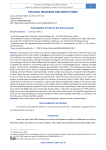
Participation of India in the Arctic Council
Статья научная
The purpose of the article is to examine India’s participation in the work of the Arctic Council by analyzing three criteria: the number of delegates sent by India to the meetings of the Arctic Council’s Senior Arctic Officials; the number of projects in which India participates as part of the Council’s working groups; the content of these projects and their distribution among the Council’s groups. The lists of participants in the meetings of the Senior Arctic Officials and the reports India provided to the Arctic Council were studied to identify the indicators. A systematic approach was used as a methodological basis; methods included analysis of documents, comparative analysis, generalization and synthesis. The following conclusions were made on the basis of the results of studying the documents: the composition of India’s delegation to the meetings of Senior Officials is represented by a smaller number of participants compared to the delegations of other Asian observer countries of the Council, which indicates that India’s environmental policy in the Arctic is not fully formed. Compared to the period 2017-2019, there was a sharp increase in the number of projects in which India participates as part of its activities in the Arctic Council in 2019-2021, which is associated with its re-election as an observer, as well as with internal institutional changes in the country. India shows the greatest interest in the projects of the AMAP, CAFF and PAME working groups, which correlates with the national document published in 2013 and the international commitments made. India is participating in ACAP and SDWG due to its climate and energy policies. India does not participate in EPPR projects. India has not yet fully exploited its potential in the work of the Arctic Council. The practical significance of the work lies in the possibility of using its findings to further build a dialogue with India; its conclusions can form the basis of future scientific research.
Бесплатно
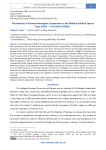
Статья научная
At the beginning of 2020s, Germany has faced with the crisis of its strategic presence at the global level: primarily to the east and to the south of NATO zone of responsibility. The possibility to compensate the losses is to ensure powerful positions in the Arctic. Germany has tried to do it through cooperation with Norway. Other NATO member states also show interest in Norway as a potential “bridge” for strategic penetration to the Arctic Ocean. The article examines the security relations between official Berlin and Oslo since the second half of the 2010s, the quality and scope of cooperation. The preservation of Norway’s value in German foreign policy planning in the context of Finland’s (2023) and Sweden’s (2024) accession to NATO is explained. A high level of trust was characteristic of the dialogue at the highest level, remaining unchanged both under Angela Merkel and Erna Solberg and under their successors Olaf Scholz and Jonas Gahr Støre (since 2021). The Bundeswehr Mountain Brigade acquired the functions of Arctic troops as a result of its use in NATO exercises in Finnmark, Norway. The joint use of frigates in the Arctic and the prospects of unification of submarine fleets are considered. The main tracks of cooperation between Germany and Norway in the issues of NATO grouping, arms supplies to Ukraine and training of its armed forces personnel are revealed.
Бесплатно
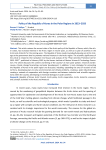
Policy of the Republic of Korea in the Polar Regions in 2023–2033
Статья научная
This article reviews the current state of the Arctic policy of the Republic of Korea, which, like other states, has increased interest in the Arctic region in recent years, as well as its plan of activities in the Arctic and Antarctic for the coming years. The Republic of Korea needs to gradually develop an Arctic strategy at the government level to promote national interests in the Arctic region. The scientific significance of the article is related to the translation into Russian and analysis of the “Polar Activities Promotion Act for 2023-2027”, published in February 2023 by the Korean Institute of Marine Science & Technology Promotion. The article discusses the content and timing of the country’s 3 main polar policies: research and discovery, climate change forecasting, and polar development. In addition, 5 main strategies for promoting the Republic of Korea in the polar region are discussed, including: expanding the area of research of the territory, developing plans to solve environmental and climate problems, creating a polar industrial base, creating a network of cooperation with foreign countries and between industrial and scientific organizations within the country, developing an interstate dialogue on polar activities.
Бесплатно
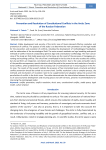
Prevention and Resolution of Constitutional Conflicts in the Arctic Zone of the Russian Federation
Статья научная
Stable development and security of the Arctic zone of Russia demand effective resolution and prevention of conflicts. The purpose of this study is to determine the main parameters of the legal model for the prevention and resolution of conflicts, including the development of methodological foundations and the elaboration of the terminological field. The main research methods are legal modeling and special methods of conflict research conducted by general, legal and constitutional conflictology. The main conclusions of the study are that stable peace and civil harmony are the result of the processes of managing, preventing and resolving conflicts. The role of law is manifested in the fact that it not only resolves the conflict, but also performs an integrative, conciliatory and stimulating function. Due to the scale and public nature of the possible consequences, special attention should be paid to the prevention and resolution of constitutional conflicts, which predetermines the increasing role of constitutional law in ensuring peace in the Arctic zone. The results of the research indicate the presence of five interrelated levels, structural and direct conflict prevention should be carried out at every level. Conflict resolution is also a complex process, the methods and mechanisms of resolution need to be supplemented and adapted, taking into account the peculiarities of conflict in the Arctic zone. The author demonstrates the interrelation between the processes of socio-economic development and ensuring peace and civil harmony, presents recommendations for improving the existing legal model.
Бесплатно
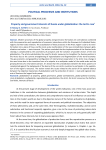
Property and government interests of Russia under globalization: the Arctic case
Статья научная
Modern processes of the global property and governance formation are contradictory combined with the preservation and reproduction of economic interactions within the framework of individual States, regions and inter-state relations. The actualization of these processes in the Arctic region is due to its transformation into a place of focus and the most acute manifestation of the new contradictions between globalization and nation — state interests. The author concluded that the implementation of the Russian Arctic strategy is complicated by the uncertainty of prospects and the variation of possible vectors of the new globalization. The article substantiates the need for drastic measures to strengthen the Russian position in the Arctic due to the current strengthening of regionalization and fragmentation of the world economy. The geo-economic and geopolitical configuration of international cooperation in the Arctic may change in the near future due to the transition from of a unipolar to a multipolar model of the world order and the growing threats of a new hybrid cold war. It’s shown that the contradictions between the Arctic powers are complicated against the background of the desire of the non-Arctic countries to participate in the exploitation of the region's resources. The author reveals the issues related to the search of the optimal balance between the objective imperatives of globalization and the protection of nation — state and regional interests of Russia as the largest Arctic power.
Бесплатно
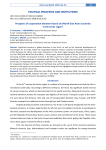
Prospects of cooperation between Russia and North-East Asian countries in the Arctic region
Статья научная
Significant increase in global attention to the Arctic, as well as the intensive development of technologies for its study, makes the cooperation between various countries increasingly important. The article discusses the history and current interaction in the Arctic region between Russia (and its predecessor, the USSR) with North-East Asia (NEA) — China, Japan, and the Republic of Korea. The author noted the increasing scientific and practical interest of the NEA countries to study the Arctic, analyzed it and main aspirations of these countries to cooperate with Russia. Also, the author reviewed the most significant internal laws and regulations governing their activities in the Arctic. It was concluded that the high prospects for cooperation between the countries of Northeast Asia and Russia occur. Main directions of possible interaction in the region are presented in the article along with the highlighted unique position of the Russian Far East as one of the critical links.
Бесплатно
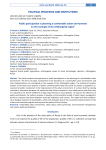
Статья научная
The article analyzes the experience of public participation in the planning of a comfortable urban environment. The forms of public involvement in the formation of a comfortable urban environment and their implementation are considered on the example of the Arkhangelsk region. The method of complex analysis of the theory and practice of public communications helps the article to present a qualitative assessment of public involvement in the improvement of the urban environment. It is shown that the existing methods of interaction between the authorities and citizens represent a one-sided process and often they are reduced to the formal fulfillment of legal requirements by municipalities. To improve the efficiency of public participation, the authors propose to develop a communicative model of urban space management based on constant interaction between municipal authorities and citizens. This model will allow establishing a dialogue between all stakeholders, which will ultimately lead to the successful implementation of the urban environmental program and improve the quality of life of citizens.
Бесплатно
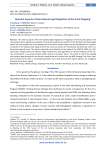
Relevant aspects of international legal regulation of the Arctic shipping
Статья научная
The critical aspects of the international legal regulation of shipping in the Arctic discussed on the international Arctic agenda are analyzed. The authors examine the specifics of the Northern Sea Route legal status from the perspective of the leading role of the Arctic coastal states and the possibilities for countries to specify at the national and regional levels the universal norms of international maritime law at the national and regional levels. The authors devoted much attention to the study of the UNCLOS 1982, Art. 234, which gives coastal states the right to adopt national laws and regulations to control pollution of the marine environment in ice-covered areas within exclusive economic zones. The article is one of the leading international legal grounds for the Russia's establishment of control over the NSR shipping. The Polar Code, entered into force in 2017, is examined separately. The article also presents expert opinions on navigation forecasts in the Arctic region.
Бесплатно
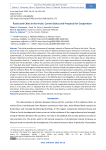
Russia and China in the Arctic: Current Status and Prospects for Cooperation
Статья научная
The article provides an assessment of strategic interests of Russia and China in the Arctic. The purpose of the study is to analyze the current state of relations between Russia and China in the Arctic, to determine the prospects for further cooperation. The authors believe that this cooperation should be examined systematically, i.e. from three possible perspectives: economics, politics and society. A significant part of the Russian Federation's territory lies above the Arctic Circle, so its interests in the region have a long history. China positions itself as a “subarctic state”, and its interests in the region have become increasingly manifested over the last decade. In 2017, the countries announced their intentions to promote the alignment of the “One Belt, One Road” initiative and the EAEU and to link it with the Northern Sea Route project. Factors contributing to the convergence of the two countries’ interests include: the deterioration of Russia’s relations with the collective West, the increasing role of China in Russia’s foreign economy and politics, and the growth of Russian hydrocarbon exports to China. The article provides examples of successful joint Russian-Chinese projects in the Arctic. The authors note that in the field of mineral extraction, successful joint initiatives include a project to drill two exploration wells in the Okhotsk Sea in the Magadan-1 and Lisyanskiy areas. The authors emphasize that there are no large infrastructure projects in the Russian Federation that are financed by Chinese investors, so the country is interested in Chinese investment for the advancement of infrastructure necessary for the development of the Arctic. Currently, cooperation between Russia and China in many areas is at its peak, and it is expected that the two countries will continue to deepen and diversify their interaction. At the same time, cooperation in the Arctic may become a central aspect of this interaction, as it is equally in the interests of both states.
Бесплатно

